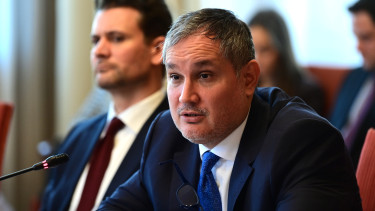Coronavirus pandemic has severe health fallout in Hungary

No official position, just experiences
Virus numbers in Hungary are on the rise again, which is why in addition to daily figures, Portfolio has also been curious to find out the long-term effects of the disease. The National Public Health Centre (NNK) has not reacted to our inquiries while the Semmelweis University, which treats long and post-Covid symptoms, referred us to expert materials published earlier. Portfolio has been able to contact Gábor Zacher, head physician of the Hatvan hospital, who shared some of his experiences.
The Hatvan hospital runs an ambulance for post-Covid patients. “There are some puzzling things. We understood lung tissue damage or myocarditis, but there are also patients whose hair is falling out in clumps, who can only smell 3 unpleasant smells and nothing else, or who have unexplained skin sensory problems,” Zacher said.
It is likely that many patients with post-Covid symptoms are not even present in the system.
This is because if the virus has not been detected in someone for a few weeks but the person has arrhythmia or sleep disorders, it is possible that their GPs will just give them various drugs but they will not make an appointment at a special ambulance.
Recurring nightmares and memory loss
There was a patient who could only smell iron, salami peel and wet dog smell after the disease, Zacher said. This was eventually successfully treated by exposure to essential oils. Another male patient experienced a burning sensation on his skin whenever he got dressed, always in the same spot. He has no traditional symptoms of skin irritation or problems with nerve endings, and the symptoms only appeared following the coronavirus infection. Doctors were able to mitigate the issue, although they do not know how they managed to do it, Zacher said.
There are no accepted treatment protocols for these Covid aftereffects, so physicians are effectively experimenting with various therapies according to Zacher
“There are people with recurring nightmares, while others experience memory problems. In the latter case, memorising poems has proven effective. We have a lot to learn before we can treat these symptoms and there are no international standards yet,” he said. Many patients have psychosomatic symptoms such as unexplained asphyxiation a long time after the virus was last detected in their bodies. In their case, psychotherapy can help overcome fears related to the disease.
Clinics are open, they are treating children, as well
A ward was opened in June at the 1st Department of Surgery and Interventional Gastroenterology to examine post-Covid gastroenterological problems. In some cases, the infection brought on an elevation in liver enzyme levels. Semmelweis Medical University reported in late summer on its website that post-Covid treatment for children was further expanded.
Several physicians of the university confirmed that nagging respiratory problems 6 to 8 weeks after coronavirus infection can already be classified as a post-Covid symptom.
The parents of children with such conditions (breathing difficulties, cough, fatigue, drowsiness) should seek medical help. A constant numbness of extremities, headaches, palpitations or chest pains also suggest post-Covid syndrome. The physicians of Semmelweis University also mentioned unexplainable rash, diarrhea and recurring abdominal pain, as well. Parents should also seek medical help if their child shows signs of anxiety, depression, lower resilience to stress and irritability.
Pulmonologist Dr. Emília Keresztes said one of their patients showed none of the above symptoms, but had no sense of smell or taste for five months which implies a great reduction to the quality of life. Another teenager developed panic attacks three months after a COVID-19 infection.
Children have been monitored for post-Covid syndrome since March, based on protocols set up by the World Health Organisation (WHO) and international recommendations. These determine the order of mandatory lab tests, as well, including respiratory test, radiographic evidence, echocardiography, EEG, 6-minute walking test when the patient has difficulty breathing.
The most difficult period awaits those that had been ventilated. Patients who need mechanical ventilation for 30 days, or - in case of elderly people – spend 2 to 2.5 months hooked up to machines, could lose up to 20 to 25 kilograms of weight, including a lot of muscle. In their case, physical therapy is required already during ventilation.
Vaccines will not protect everyone but will minimise fatalities
Gábor Zacher, told Portfolio yesterday about a 70-year-old patient who could not be saved despite several resuscitation attempts. It took the rapid Covid test 30 seconds to show coronavirus infection, and although the patient received both doses of a U.S. vaccine, it was still not enough. This proves that even the vaccines are not 100% effective, but in most cases they prevent from severe symptoms and can save lives, stressed Zacher over the phone.
He highlighted how important it would be for authorities to disclose vaccination data. In health care – and this is a recurring complaint on Portfolio’s pages, as well – they complain that there’s no public information on how many of the new COVID-19 cases are vaccinated and how many of them have not received even a single dose.
This, he argues, could give new impetus to vaccinations among those that are sceptical about Covid shots. He has mentioned an example from the UK where there’s a 13 to 14 times difference between vaccinated and unvaccinated people in respect of coronavirus-related deaths. Simply put, if you have not received any kind of coronavirus vaccine, your chances of dying in case of a severe infection or a weaker immune system is 13 to 14 times greater than those that have received some kind of COVID-19 vaccine.
Cover photo: MTI/ Noémi Bruzák







